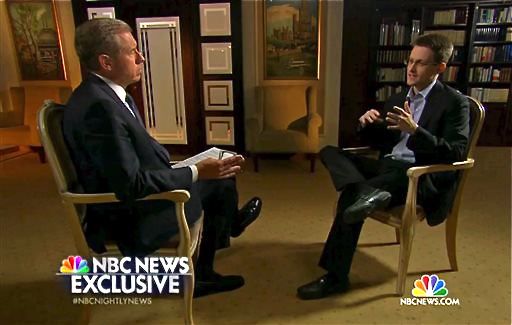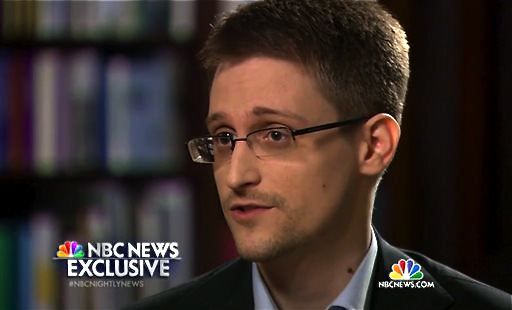Edward Snowden, in an hour-long television interview broadcast Wednesday night, portrayed himself as a “patriot” who broke the law in an act of “civil disobedience” directed at “massive” constitutional violations by the U.S. government.
While Snowden said he would like to return to the United States from Russia, where he sought asylum after leaking thousands of documents detailing the extent of the government’s sprawling surveillance program, he said he was not about to “walk into a jail cell.”
That, he said, would serve as a “bad example for other people in government who see something happening, some violation of the Constitution, and think they need to say something about it.”
Snowden, a fugitive, has been charged with theft and espionage by the U.S. government.
Asked directly by NBC’s Brian Willliams whether he was looking for “clemency or amnesty,” Snowden said, “I don’t think there’s ever been any question that I’d like to go home. I mean, I’ve from day one said that I’m doing this to serve my country. Now, whether amnesty or clemency ever becomes a possibility is not for me to say.
“That’s a debate for the public and the government to decide,” said Snowden, whose leaked documents detailing the U.S. government’s sprawling surveillance efforts sparked an additional debate over that program’s future.
He said disclosing those documents was an act of patriotism. “Being a patriot doesn’t mean prioritizing service to government about all else,” Snowden, who was interviewed in Moscow, told Williams. “Being a patriot means knowing when to protect your country and knowing when to protect the Constitution against the encroachment of adversaries. Adversaries don’t have to be foreign governments. They can be bad policies.”
Asked about his relationship with the Russian government, he said he had none “at all. I’ve never met the Russian president. I’m not supported by the Russian government. I’m not taking money from the Russian government. I’m not a spy, which is the real question.”
“There are times that what is right is not the same thing as what is legal,” Snowden said. “Sometimes to do what’s right you have to break the law.”
On Wednesday, Secretary of State John Kerry characterized Snowden’s actions, however, as “betrayal,” telling him to “man up” and return home. “The bottom line is this is a man who has betrayed his country, who is sitting in Russia, an authoritarian country where he has taken refuge. . . If he has a complaint about what’s wrong with American surveillance, come back here and stand in our system of justice.”
The government has charged the one-time employee of the National Security Agency contractor with theft and violations of the 1917 Espionage Act for disclosing the details of the government’s electronic spying program to news organizations, including The Washington Post and The Guardian, which won the Pulitzer Prize for stories derived from materials provided by Snowden.
Beyond a grainy Hong Kong interview and several remote appearances, Snowden has rarely been seen since he leaked those documents. On Wednesday night he appeared relaxed, wearing a blue, button-down open shirt, and cracked a few jokes.
The former analyst, who now describes himself as someone who was a “spy” when he did work for the NSA, said he spends time in Russia, where he does not speak the language, watching the television show, The Wire, which he “loves.” He said he didn’t bring any documents to Russia because he thought that would make him look like “Tweety Bird to Sylvester the Cat. I [would] look like a little walking chicken leg with all these documents.”
The course that ultimately brought him to Russia, Snowden says, began with the September 11, 2001 attacks. “I remember the tension of that day,” he said. “I remember hearing on the radio the planes hitting. And I remember thinking my grandfather, who worked for the FBI at the time, was in the Pentagon when the plane hit.”
The attack, he claimed, changed him. In 2004, he enlisted in the U.S. Army special forces, but an injury sidelined his military aspirations. NBC reported he had broke both his legs, but didn’t provide additional details.
“I was injured very early on in the program and washed out,” Snowden said. “. . .The reality is, as you can see, I’m not a well-built guy. Perhaps I bit off a little more than I can chew.”
Snowden said the aftermath of the Sept. 11 attacks was manipulated by the government to hatch sweeping surveillance services. “The government sort of exploited the national trauma that we all suffered together and worked so hard to come through to justify programs that have never been shown to keep us safe, but cost us liberties and freedoms that we don’t need to give up and our Constitution says we should not give up.”
While maintaining his right to do everything he can to keep the United States safe, Obama said in a speech earlier this year that he too has “healthy skepticism” of the country’s surveillance programs and vowed to increase oversight.
To Snowden, more is needed than oversight. In his interview, he mentioned the Constitution 22 times, and said his concerns over the surveillance programs grew as he “rose to higher and higher levels in the intelligence communities. I gained more and more access, as I saw more and more classified information. . . I simply realized that so many of the things that were told by the government simply aren’t true.”
His disillusionment was confirmed, he said, after he learned more of the country’s surveillance services. He claimed he told the N.S.A.’s legal team of his worries. “The NSA has the records,” he said, calling on authorities to publicize his dispatches. “. . .And the response more or less, in bureaucratic language, was, ‘You should stop asking questions.’”
He didn’t, however, and says the ease with which he stole the national documents amounts to governmental negligence. “Their auditing was so poor, so negligent, that any private contractor — not even an employee of the government — could walk into the N.S.A. building, take whatever they wanted, and walk out with it and they would never know.”
The moment he decided to fork over the documents to journalists was “intimidating,” he said. But framing the decision as a moral one, he says it was one he does not regret, even though he faces incarceration in the United States. “I may have lost my ability to travel,” he said. “But I’ve gained the ability to go to sleep at night.”
Send questions/comments to the editors.




Success. Please wait for the page to reload. If the page does not reload within 5 seconds, please refresh the page.
Enter your email and password to access comments.
Hi, to comment on stories you must . This profile is in addition to your subscription and website login.
Already have a commenting profile? .
Invalid username/password.
Please check your email to confirm and complete your registration.
Only subscribers are eligible to post comments. Please subscribe or login first for digital access. Here’s why.
Use the form below to reset your password. When you've submitted your account email, we will send an email with a reset code.